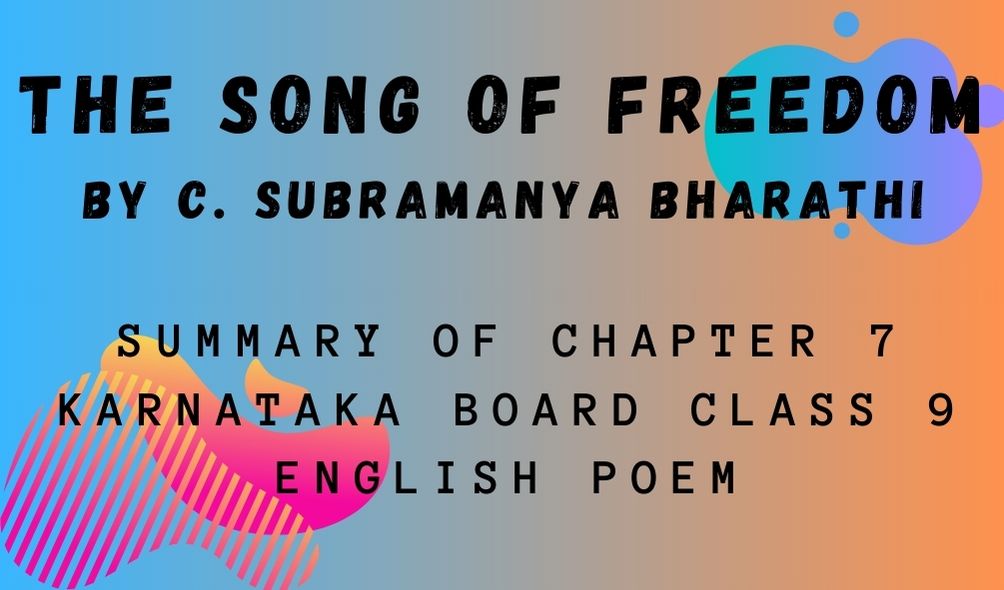You are going to go through the Summary of THE SONG OF FREEDOM Chapter 7 Karnataka Board Class 9 English Poem. Understanding a story meticulously in its entirety is very important for a learner for scoring better in the exam. Experts made every effort to ensure a thorough and proper summary of the story. Let us find the Summary of THE SONG OF FREEDOM Chapter 7 Karnataka Board Class 9 English Poem.

About the poem:
This poem celebrates the freedom of our country. The poet talks about not only a free India, but also a glorious India. The poet wanted to wake the slumbering masses and inspire them. Overall, the poem is about how the poet sees our nation to be.
Structure of the poem:
The Song of Freedom
“This is the hour
Of song and dance,
For blissful freedom
Is ours at last.
Gone are those days of caste-born pride.
Gone is the foreigner’s might:
Gone is passive subservience
Gone is the trickster’s sway.
Freedom is our universal speech,
Equality the experienced grace;
We’ll blow the conch of victory
And publish the truth to all.
We see that all are equal born;
Now lie and deceit are dead;
Summary of THE SONG OF FREEDOM Chapter 7 Karnataka Board Class 9 English Poem
Only the good men are great –
Ruin has seized and wicked.
Honour to the ploughman and the worker!
Shame to the glutton and the rake!
We’ll not water the wastelands,
Nor sweat for the idler’s weal!
We’ve learnt that this is our own land,
It will be forever ours;
No nation shall enslave us again;
We’ll prosper serving God, our sole Lord.”
There is no specific rhyming pattern.
Line by line analysis of the poem:
Lines 1- 4:
“This is the hour
Of song and dance,
For blissful freedom
Is ours at last.”
In the first stanza, the poet celebrates the freedom of our nation. The poet wants us to enjoy it with songs and dance.
Summary of THE SONG OF FREEDOM Chapter 7 Karnataka Board Class 9 English Poem
Lines 5- 8:
“Gone are those days of caste-born pride.
Gone is the foreigner’s might:
Gone is passive subservience
Gone is the trickster’s sway.”
In this stanza, the poet says that now we are free of all sorts of oppression. Casteism is gone now. We don’t need to fear the foreigners’ rule anymore. We don’t have to be passive anyway. Trickers will no more be able to trick us any way.
Lines 9- 12:
“Freedom is our universal speech,
Equality the experienced grace;
We’ll blow the conch of victory
And publish the truth to all.”
By the first line of this stanza, the poet means that all of us should stay united and prioritise our freedom over anything else. We should believe in equality and grace. The poet says that with all the aforementioned factors, we will achieve victory. We will prove our worth to the whole world.
Lines 13- 16:
“We see that all are equal born;
Now lie and deceit are dead;
Only the good men are great –
Ruin has seized and wicked.”
In this stanza, the poet says that all are born equal. There is no place of lie and deceit. According to him, period of destruction has to be over and only good men will prevail.
Lines 17- 20:
“Honour to the ploughman and the worker!
Shame to the glutton and the rake!
We’ll not water the wastelands,
Nor sweat for the idler’s weal!”
We should show our due respect to the farmers and workers and to everybody else. We would not be wasting our time on unnecessary events.
Summary of THE SONG OF FREEDOM Chapter 7 Karnataka Board Class 9 English Poem
Lines 21- 24:
“We’ve learnt that this is our own land,
It will be forever ours;
No nation shall enslave us again;
We’ll prosper serving God, our sole Lord.”
The poet wants us to realise that this is our land. This should always be ours. We should believe that we would never get enslaved again. We should do our duties and serve God. That’s how we will prosper and so will the nation.
Figures of speech used in the poem:
Alliteration: This is a figure of speech where closely associated words or corresponding words begin with the same alphabet in a sentence.
“Gone is the trickster’s sway.”
“Equality the experienced grace”
Anaphora: This is a figure of speech where words repeat at the beginning of successive clauses or sentences.
“Gone are those days of caste-born pride.
Gone is the foreigner’s might:
Gone is passive subservience
Gone is the trickster’s sway.”
